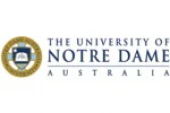
Bachelor of Arts / Bachelor of Behavioural Science
The University of Notre Dame Australia
Type of institution: University/Higher Education Institution
Level: Undergraduate
CRICOS: 01032F
Bachelor of Arts graduates think critically, creatively and ethically to solve problems and are culturally and globally aware. They have research and communication skills and can work both autonomously and with others. Students develop core skills through in-depth study of at least one major discipline area, selected from the traditional humanities, social and behavioural sciences, and/or communications and media. In upper year levels, students may undertake specialised learning that complements their professional and/or personal interests. Internships enable students to apply knowledge and skills in the workplace and to hone work-ready aptitudes. Students can also take advantage of short and long-term international learning opportunities through the Experience the World and Study Abroad programs. Arts graduates are valued across a range of industries and workplaces, and are well-placed to make a life-long contribution to the intellectual, cultural and civic life of communities. The Bachelor of Behavioural Science is a unique trans-disciplinary social science based on a foundation of critical psychology, political science, cultural studies and sociology. Integrating specialised knowledge developed in these social science disciplines, and with a strong focus on critical psychology, means that the degree provides the nexus between understandings and practices of traditional psychology and social work. Students develop an understanding of their place and role in society as well as respect for social and cultural diversity. Embedded within the degree is a specific emphasis on the assumptions and practices that promote substantive reconciliation with Aboriginal and Torres Strait Islander Peoples. Students are encouraged to incorporate political, economic, cultural and other social influences that promote or obstruct human behaviour. They learn to analyse the individual, group, and societal levels to examine how people respond to the various situations they experience; this includes the influences that institutions and systems have on people. Graduates work with those who may be experiencing marginalisation to develop and support social justice based on empowerment and liberation. They critically evaluate information and apply professional reflexive practice to any career that requires analysis and interpretation of human behaviour to promote wellbeing.
Structure
Must complete a minimum of 800 Units of Credit, which include the following required and elective courses:
Subjects
- Archaeology
- Behavioural science
- English literature
- Environmental management
- History
- Journalism
- Mathematics
- Philosophy
- Politics and international relations
- Screen Arts
- Social justice
- Theology
Standard entry requirements
- School Leavers: ATAR of 70 (indicative only). Applicants must have obtained this score within the last five years
- IB of 25+ (indicative only). Applicants must have obtained this within the last five years
- Post School Leaver/Mature Age Applicants: Successful completion of a Notre Dame enabling program
- One semester (FTE) success in an undergraduate university course
- Certificate IV completed at a Registered Training Organisation (TAFE) or equivalent
- STAT score of 145 or higher
- Mature-age completion of two Year 12 WACE exams with a resulting ATAR of 70.




